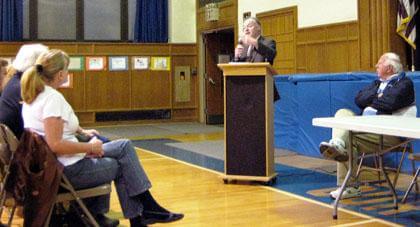By Jeremy Walsh
Contamination levels at the future site of a new high school in Maspeth are considerably higher than allowable state standards, the Juniper Park Civic Association and elected officials warned at a meeting last week, while the city maintained that the pollution was no more severe than at any other potential school site in the city.
James Cervino, a marine biologist working with the civic, called on the city to replace the polluted soil at the property, citing toxin levels several times above the standards of the state Department of Environmental Conservation and noting that some of the compounds found in the study caused cancer in laboratory experiments.
“Clean it up,” he said at last Thursday’s meeting. “Use state DEC−approved soil. Take out the bad stuff. To me, it’s a no−brainer.”
But Michael Tumulty, an engineering consultant for the SCA, defended the city’s findings, noting that there was nothing remarkable about the contamination found at the former Restaurant Depot site at 57th Avenue and 74th Street.
“As a professional engineer, as a person, I guarantee it,” Tumulty said of the site’s safety, although he admitted he could not get his consulting firm to back that up.
Under questioning from Lydon Sleeper, chief of staff for City Councilwoman Elizabeth Crowley (D−Forest Hills), Tumulty said it was the agency’s “judgment call” on whether contamination such as that at the Maspeth site required brownfield cleanup measures like soil replacement.
The city School Construction Authority intends to install a plastic liner underneath the school’s foundation and run a pipe through the building to the roof to ventilate any potential fumes that could collect below. Tumulty was quick to point out that the SCA testing did not indicate the presence of any chemicals that would produce hazardous fumes.
Cervino noted that uncontaminated infill costs $47 per cubic yard. Tumulty said the current layer of contaminated urban fill underneath the 52,100−square−foot warehouse extends 10 feet down. Based on those figures, it would cost the DOE approximately $907,000 to replace the soil. The entire budget allotment for the school was between $70 million and $80 million, including the cost of the plastic liner and the vapor ventilation system, the city Department of Education said.
“It’s not something we’re going to pursue,” DOE spokesman Will Havemann said of replacing the soil. “The School Construction Authority has standards for when it is necessary to take preventative measures in a school building and when it’s necessary to actually clean up the site. The level of contamination at this site did not meet that standard.”
Juniper Park Civic leaders accused the SCA of trying to keep the contamination from the public.
“We never saw these numbers until after the Council voted,” civic President Robert Holden said.
Sleeper confirmed that the complete results from the soil samples were not provided to Crowley’s office until last week.
State Sen. Joseph Addabbo (D−Howard Beach), who also attended the Juniper Park meeting, said he would consider introducing state legislation that would require the city to conduct an intensive soil analysis and replace any contaminated soil before building.
“We should have a standard that is set for school sites,” he said. “Children’s immune systems are different from adults’.”
But Havemann said such legislation would hamstring the city’s ability to keep up with the demand for school seats.
“I don’t know the cost offhand, but I’m sure that it would raise the cost prohibitively in many cases,” he said.
Reach reporter Jeremy Walsh by e−mail at jewalsh@cnglocal.com or by phone at 718−229−0300, Ext. 154.


































